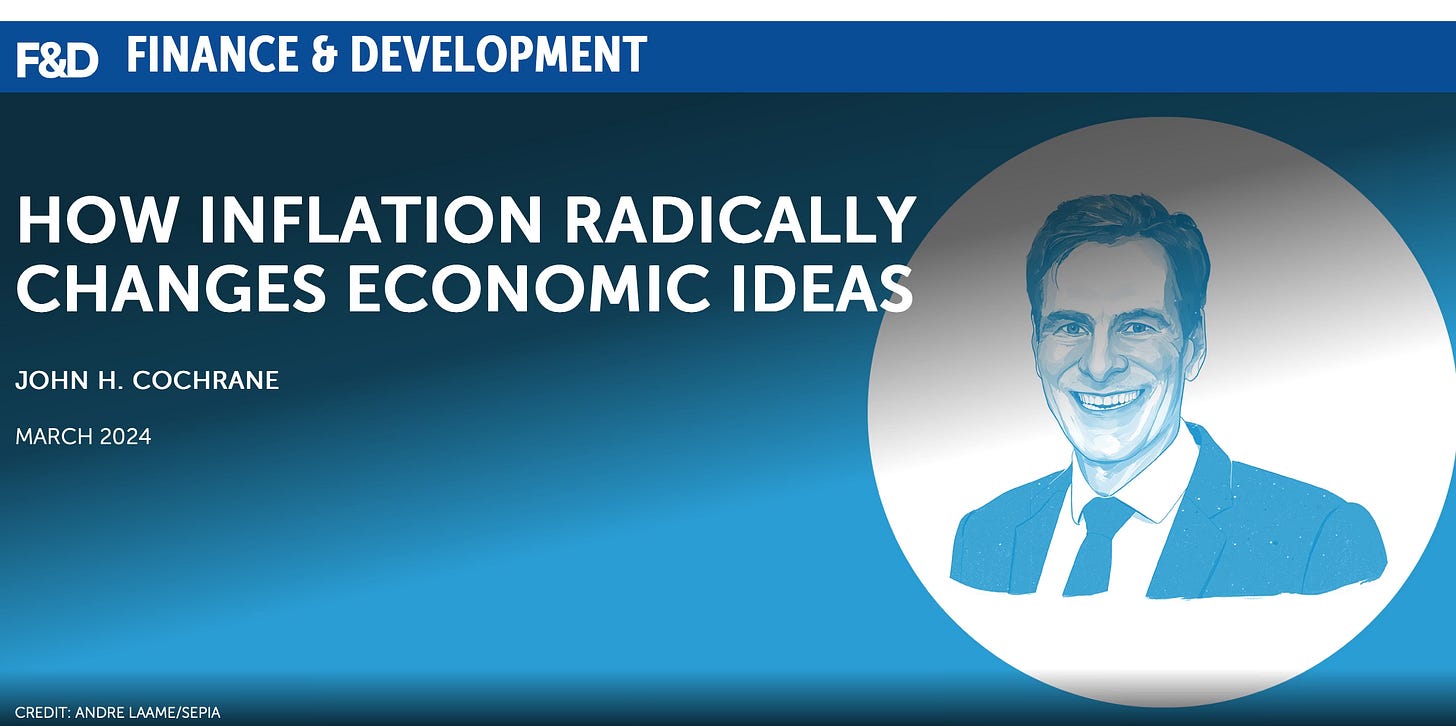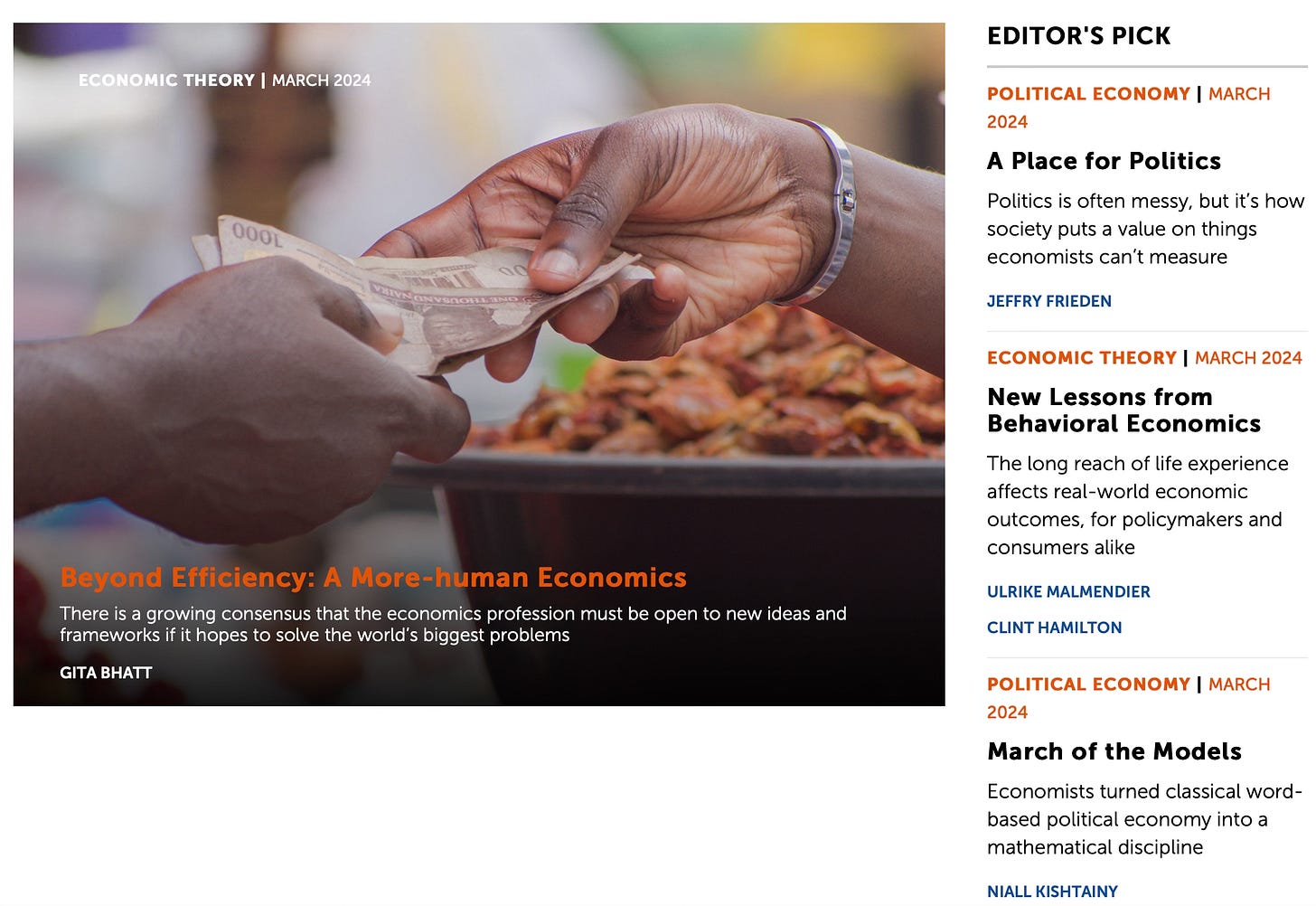How Inflation Changes Economic Ideas
This is a little essay that I wrote for collection sponsored by the IMF. My prompt was to answer “how the profession must change to become better at answering twenty-first-century challenges. How do we need to think about the big topics in economics and what are the implications?” In 1000 words or less. Grumpy’s reaction is pretty predictable. (Before I depart this earthly vale I must train a chatbot on Grumpy Economist blogs. I bet the answer would not be much different.)
Here it is. Also the original here at the IMF (give it a click so the IMF will know people read it!) and the collection of all the essays at the IMF.
*****
How Inflation Radically Changes Economic Ideas
Inflation teaches us that supply, not demand, constrains our economies, and government borrowing is limited.
The unexpected resurgence of inflation is a slap in the face, telling us that the consensus ideas of economic policy are wrong and need to change. Fortunately the “new” ideas we need are well tested and sitting on the shelf.
Inflation comes when aggregate demand exceeds aggregate supply. The source of demand is not hard to find: in response to the pandemic’s dislocations, the US government sent about $5 trillion in checks to people and businesses, $3 trillion of it newly printed money, with no plans for repayment. Other countries enacted similar fiscal expansions and reaped inflation in proportion. Supply is more contentious. Supply did shrink during the pandemic. But inflation spiked after the pandemic was largely over, and many “supply shock” industries were producing as much as before but could not keep up with demand.
But just how much inflation came from demand, induced by looser fiscal or monetary policy, versus reduced supply matters little for the basic lesson. Inflation forces us to face the fact that “supply,” the economy’s productive capacity, is far more limited than most people previously thought. The mantras of the 2010s—“secular stagnation,” “modern monetary theory,” “stimulus”—which preached that prosperity needed only for the government to borrow or print a huge amount of money and hand it out, are in the dustbin. You asked for it. We tried it. We got inflation, not boom.
The mantras of the 2010s, which preached that prosperity needed only for the government to borrow or print a huge amount of money and hand it out, are in the dustbin.
A supply-limited economy requires supply-oriented policy, not stimulus, to grow. “Jobs” are now a cost, not a benefit. With 3.7 percent US unemployment, every worker employed on a make-work project is one not doing something more important. Regulations make housing far too costly and time-consuming to build. A coherent immigration system brings in people who work, produce, and pay taxes. We need public infrastructure, but its obscene excess cost is a rathole we can no longer afford. Tariffs that force us to overpay for things foreigners can provide better are just a drain on the economy. Policy focused on who gets what must now focus on incentives, which are the key to growth.
The cancer of stagnation
Stagnation is the quietly insidious economic cancer of our era. US growth fell by half after 2000. Europe and the UK are stagnating even more. Italy has not grown in per capita terms since 2007. Reviving long-term growth drowns any other policy, and only supply, efficiency, productivity, and incentive-oriented policy can revive long-term growth.
The view that there is unlimited demand for government debt, with buzzwords like “savings glut” or “safe asset shortage,” has equally proved false. The US, UK, and Europe seem to be able to borrow about 100 percent of GDP. More debt leads to higher interest rates, trouble borrowing, and inflation as people try to spend the extra debt rather than hold on to it as a good investment.
From now on, governments must spend money as if they have to raise taxes to pay for it, now or later. They do. Projections that debt will serenely grow to 200 percent of GDP under primary deficits that are eternally 5–10 percent of GDP will simply not happen. Worse, we have lost our fiscal capacity to react to shocks. If the $5 trillion pandemic response was more debt than people will hold and caused inflation, the $10 trillion response to the next crisis will face even more trouble.
Our left wing wants to spend trillions of dollars on cost-ineffective climate subsidies, such as massively oversize electric cars built in the US, by union labor, with US parts. Our right wing wants to spend trillions of dollars on protection and industrial subsidies in a vain (and unwise) quest to bring back 1950s manufacturing. Industrial policy will do for chips what the Jones Act (the Merchant Marine Act of 1920) did for shipping. Now that money is no longer free, we can only afford spending that actually works.
Inflation’s lessons
This inflation has two deep lessons for monetary and financial policy. First, central banks do not entirely control inflation. Inflation control needs fiscal probity as well. Second, the fiscal blowout was in part a financial bailout, including support for Treasury, municipal, and corporate debt; money market funds; airlines; and others. The central “no more bailouts” promise of the Dodd-Frank financial reform failed. In my view, another 100,000 regulations will fail again, and the only answer is the simple classic vision of equity-financed banking.
These may seem like old ideas. That’s great. Progress in economics has never come from pontificators who urge someone else to throw new ingredients in the pot—say, to “care more about people,” “add psychology,” “mix politics and economics,” incorporate “real-world” complications or “heterodox” ideas—stir, and hope that a digestible soup comes out. Progress in economics has always come from answers, patiently worked out, empirically verified, simplifying reality to actionable cause and effect statements. Economic policymaking suffers from too many pundits who rush to Washington to demand trillions of spending and untold intrusions in people’s affairs, based on half-baked stewpots of novel ideas. Economic policy should rely on well-tested notions. When economists try to supply ideas in response to political demands for the appearance of novelty, they dispense bad economics and bad politics. And what seems old to us can appear novel too. Adam Smith’s 250-year-old ideas are still news to most in politics.
*****
You can see in my last paragraph a bit of my guess at what the IMF was looking for and expecting. True? Here are the other essays. Some yes, some no.
The “editor’s pick” and lead article fit just what I grumpily expected, and are a pretty sad sampling of what the IMF thinks is important these days:
Add ingredients, stir the pot, and maybe something other than boring old incentives and budget constraints will pop out. Someday. And someone else should do it.
My fellow commenters did much better. Atif Man and Michael Kremer have very specific concrete ideas. I largely disagree with the former, but at least it’s specific. Angus Deaton has a nice essay on changing your mind. I found it a bit flawed in places, simply by getting things wrong. “We did not collectively predict the financial crisis and, worse still, we may have contributed to it through an overenthusiastic belief in the efficacy of markets. “ Sorry, the theory of efficient markets says precisely that prices are unpredictable! But it reflects a nice humility. The other two seem to fit more the mold that I expected — and rebelled against, as you can see.




Nice that you point to Adam Smith in the week that existentialcomics does the same.
EC ... "In order to modernize, societies essentially had to get rid of the feudal lords and put all of their money into the hands of capitalists as much as possible, to kick start this kind of economic growth."
i.e. the capitalists would do stuff that re-employed the people who were displaced by innovations that increased productivity and put people out of jobs. Whereas the feudal lords would take any surplus and turn that into personal luxuries for themselves. Let's not allow our capitalists to become feudal lords.
Great job. The words "fiscal probity" identify what is needed. I wish this was more widely understood.